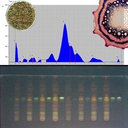Anticancer potential of selected Fallopia Adans species.
Cuvinte cheie
Abstract
The aim of the present study was to determine the anticancer potential of three species belonging to the Fallopia genus (Polygonaceae): Fallopia convolvulus (F. convolvulus, Fallopia dumetorum (F. dumetorum) and Fallopia aubertii (F. aubertii). For this purpose, crude extracts were obtained and characterized for their phenolic and flavonoid total content and examined for their anticancer activity on three tumor cell lines: breast cancer (MCF7), colon carcinoma (Caco-2) and cervical cancer (HeLa) cells. The cytotoxic potential of the three species was assessed by MTT assay, cell cycle analysis and by the evaluation of mitochondrial membrane potential (MMP). The acute toxicity of the extracts was evaluated using one in vitro cell model (Vero cells, an African Green monkey kidney cell line) and two invertebrate in vivo models (Daphnia magna and Artemia salina). The highest total phenolic and flavonoid content was found in the F. aubertii flower extracts. The cytotoxic effects of the extracts from F. aubertii and F. convolvulus on all three cell lines were examined at concentrations ranging from 3 to 300 µg/ml. G2/M cell cycle arrest was induced by all the extracts, and a significant increase in the subG1 cell population was observed. The hydroethanolic extract from the flowers of F. aubertii induced cell apoptosis more rapidly than the other extracts. The MMP indicates the involvement of the mitochondria in the induction of apoptosis. A positive correlation between the total phenolic content of the extracts and the IC50 values against the HeLa cells was also noted. None of the extracts exhibited significantly toxic effects. Considering the antitumor potential of F. aubertii and F. convolvulus, these two species may represent a good source of plant extracts with anticancer properties.


